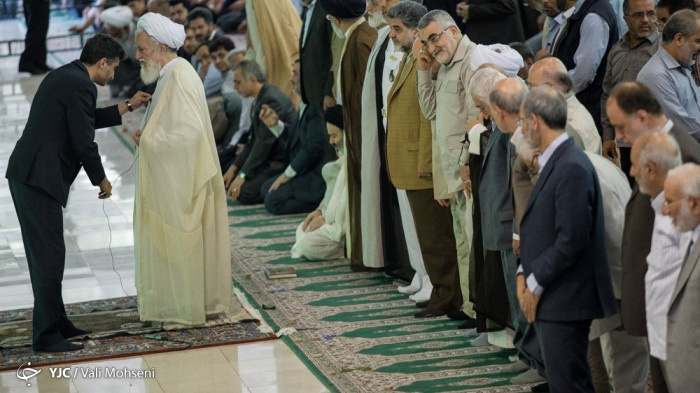Friday Prayers across Iran: Pay slip scandal, JCPOA and regional developments

This week’s Friday prayers was dominated by Ahmad Alamolhoda’s vitriolic remarks against Hassan Rouhani, calling him “naïve” for his defense of JCPOA, the nuclear deal.
“Is it dignity that an Italian modeling company corrupts your daughters and wives, your youngsters, and turn here [Iran] into a market for its cheap products?” Alamolhoda asked.
“This naïve man is saying that ‘JCPOA brought us’ dignity” Alamolhoda said, addressing Rouhani’s recent remarks in defense of the nuclear deal.
In Qazvin, northwest of the capital, Abdolkarim Abedini, an unrelenting critic of the nuclear deal, also addressed the same topic, though in a much milder tone. Abedini complained about Rouhani’s insistence on the advantages of JCPOA, which the president reiterated in his TV interview one day after Ayatollah Khamenei’s criticism of the deal. “The Leadership’s words were disrespected” Abedini said.
Friday prayers’ leaders across the country continued their criticism of the pay slip scandal, more and more turning into an embarrassment for Rouhani’s government, this week. In Tehran, Ayatollah Movahhedi Kermani compared those recipients of hefty salaries who had returned the sum back to public funds to people who had made wudu, ritual Islamic ablution, with unclean water, asking them to make up for what they have taken.
In Ahwaz, center of Khuzestan Province, Friday prayers leader Ayatollah Mousavi Jazayeri hailed advances by the “Resistance Front” in Aleppo, Syria, and Mosul, Iraq. Jazayeri warned about Washington’s call for ceasefire, calling it a “hoax” aimed to rehabilitate anti-Assad forces.
Saudi Arabia was bashed following the trend of the past one year. In Azerbaijan region, Friday prayers’ leaders in Urmia and Ardabil slammed Riyadh for their recently not-so-furtive contact with Israel and for banning Iranian pilgrims to visit Mecca and Medina, Islam’s two holiest cities, in this year’s Hajj ritual. The Saudi house “has reduced the sacred practice of Hajj to a tool for pressure, ransom, and revenge” said Ayatollah Ameli in Ardabil.

